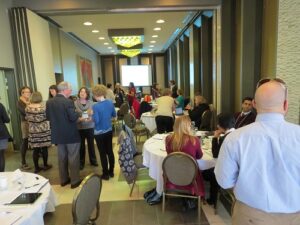by Virginia Wilson
Director, Centre of Evidence Based Library and Information Practice
So, the 4th C-EBLIP Fall Symposium: Librarians as Researchers has been cancelled. The response to the call for submissions was less robust than we had hoped. October seems to have become second conference season with other conferences in Canada happening at or around the same time as ours. And to be honest, as C-EBLIP Director, I’ve got some personal and professional things going on that have left me with limited time to really focus on the symposium. I’ve been so proud to be involved in hosting our past symposia (symposiums?). I believe they made a big difference at a particular time in Canadian librarianship, offering a new space to share ideas and our research, and an enhanced focus on librarians as researchers. I don’t imagine we’ll try again, as things change and people move on (but I’m not going to say never). I am keeping reference to the past Fall Symposiums on the C-EBLIP website including the three programs. Who knows? Some collaborations may still be created by having that information to reference.
However, even though there is no Fall Symposium to attend, we are extremely happy to have Jessie Loyer, the announced symposium keynote speaker and workshop presenter, join us at the U of S on October 17, 2018. Jessie is the liaison librarian for Indigenous Studies and Anthropology at Mount Royal University in Calgary.  Jessie Loyer is Cree-Métis and a member of Michel First Nation. She is a liaison librarian at Mount Royal University in Calgary, a guest on Treaty 7 and Blackfoot territory. Her research looks at Indigenous perspectives on information literacy, supporting language revitalization, and creating ongoing research relationships using a nêhiyaw minâ otipêmisiw concept of kinship.
Jessie Loyer is Cree-Métis and a member of Michel First Nation. She is a liaison librarian at Mount Royal University in Calgary, a guest on Treaty 7 and Blackfoot territory. Her research looks at Indigenous perspectives on information literacy, supporting language revitalization, and creating ongoing research relationships using a nêhiyaw minâ otipêmisiw concept of kinship.
She will be delivering a workshop the morning of October 17 entitled “Where Do You Work? Rooting Responsibility in Land.” Here’s a description provided by Jessie:
Through a series of guided questions and discussions, this workshop helps participants reflect on the implications of their presence on Indigenous land. There is a tendency to position Indigenous communities as only historical, only rural, only poor, and only reservation communities – while these communities are certainly still part of the conversation, they are not the only Indigenous communities libraries should consider. Librarians will be identifying the territories on which they live, work and play, local relationships and resources, and how often and at what level Indigenous folks are engaged in planning and decision-making at their libraries.
The workshop will run from 9:30 am to 12:00 noon in the Murray Library on the U of S campus. Space is limited so if you are interested in attending this free workshop, you’ll need to register using our online registration form.
On the afternoon of October 17, Jessie will be giving a talk open to everyone entitled “On Research and Positionality: Silence, Ownership, and Power”:
Heightened awareness of Indigenous issues has led to an increase in Indigenous research done at universities, research grants available in this area, and in CRCs with a focus on Indigenous content. But what does “Indigenous research” actually mean? And what benefit does research have to Indigenous communities? This talk will consider who owns Indigenous research, with an emphasis on intellectual property, the politics of refusal, the First Nations Principles of OCAP (ownership, control, access, and possession), and the ways that researchers might reflect on their own positionality.
The talk will be held at the College of Law in Room 64 on the U of S campus at 2:00 pm. Everyone is invited to attend with no registration required.
I hope you can join us for a day of learning, insight, and collegiality as we welcome Jessie Loyer to the University Library, U of S campus.





